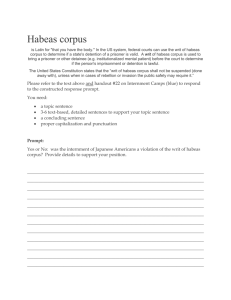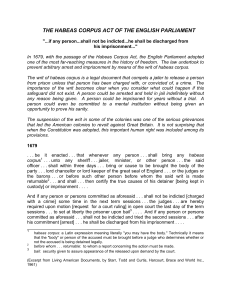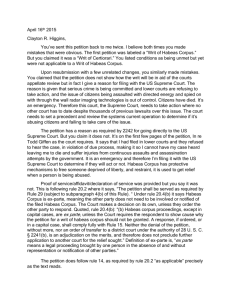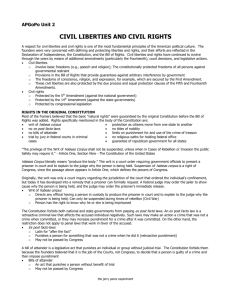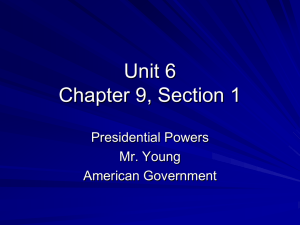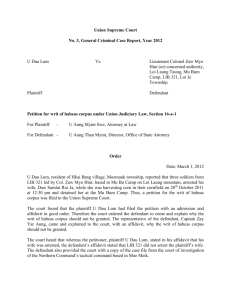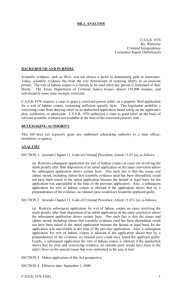84-1479 Kuhlmann v. Wilson
advertisement
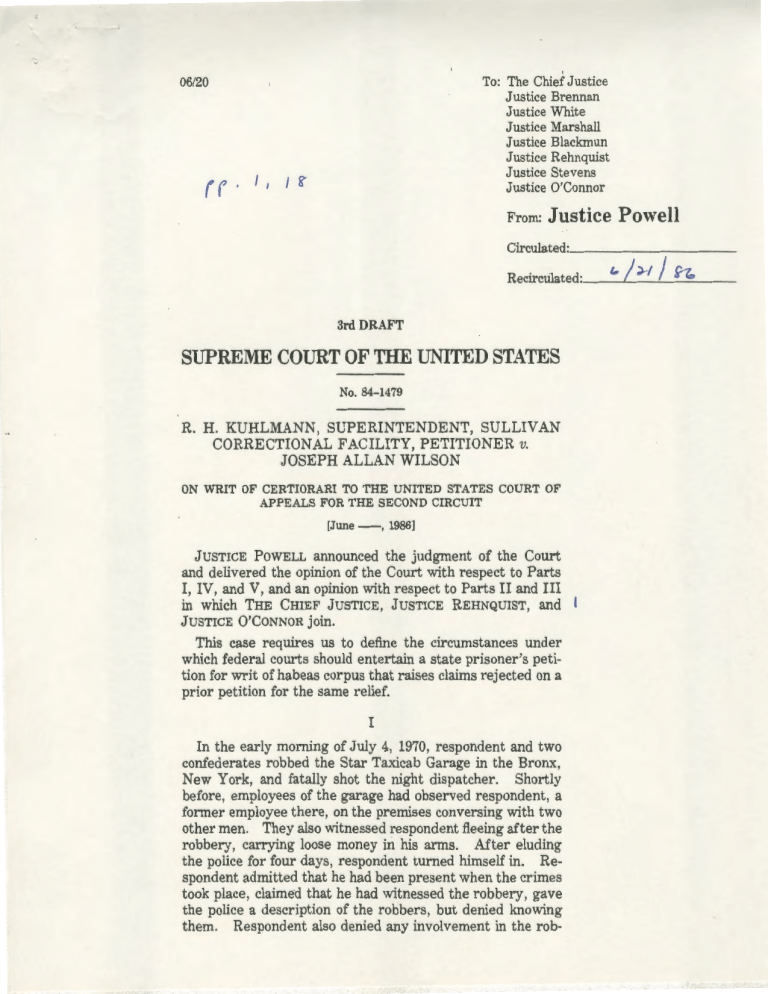
'
To: The Chief Justice
Justice Brennan
Justice White
Justice Marshall
Justice Blackmun
Justice Rehnquist
Justice Stevens
Justice O'Connor
06/20
(('·I,
lg
From:
Justice Powell
Circulated: _ _ _ _ _ _ _ _ __
Recirculated: _ _
,.,_L/_ J._ I ..!_/_ fb
- =---
3rd DRAFT
SUPREME COURT OF THE UNITED STATES
No. 84-1479
R. H. KUHLMANN, SUPERINTENDENT, SULLIVAN
CORRECTIONAL FACILITY, PETITIONER v.
JOSEPH ALLAN WILSON
ON WRIT OF CERTIORARI TO THE UNITED STATES COURT OF
APPEALS FOR THE SECOND CIRCUIT
[June-, 1986]
JUSTICE POWELL announced the judgment of the Court
and delivered the opinion of the Court with respect to Parts
I, IV, and V, and an opinion with respect to Parts II and III
in which THE CHIEF JUSTICE, JUSTICE REHNQUIST, and
JUSTICE O'CONNOR join.
This case requires us to define the circumstances under
which federal courts should entertain a state prisoner's petition for writ of habeas corpus that raises claims rejected on a
prior petition for the same relief.
I
In the early morning of July 4, 1970, respondent and two
confederates robbed the Star Taxicab Garage in the Bronx,
New York, and fatally shot the night dispatcher. Shortly
before, employees of the garage had observed respondent, a
former employee there, on the premises conversing with two
other men. They also witnessed respondent fleeing after the
robbery, carrying loose money in his arms. After eluding
the police for four days, respondent turned himself in. Respondent admitted that he had been present when the crimes
took place, claimed that he had witnessed the robbery, gave
the police a description of the robbers, but denied knowing
them. Respondent also denied any involvement in the rob-
84-1479---0PINION
KUHLMANN v. WILSON
3
tails of his original account. Respondent then received a
visit from his brother, who mentioned that members of his
family were upset because they believed that respondent had
murdered the dispatcher. After the visit, respondent again
described the crimes to Lee. Respondent now admitted that
he and two other men, whom he never identified, had
planned and carried out the robbery, and had murdered the
dispatcher. Lee informed Cullen of respondent's statements
and furnished Cullen with notes that he had written surreptitiously while sharing the cell with respondent.
After hearing the testimony of Cullen and Lee, 2 the trial
court found that Cullen had instructed Lee "to ask no questions of [respondent] about the crime but merely to listen as
to what [respondent] might say in his presence." The court
determined that Lee obeyed these instructions, that he "at
no time asked any questions with respect to the crime," and
that he "only listened to [respondent] and made notes regarding what [respondent] had to say." The trial court also
found that respondent's statements to Lee were "spontaneous" and "unsolicited." Under state precedent, a defendant's volunteered statements to a police agent were admissible in evidence because the police were not required to
prevent talkative defendants from making incriminating
statements. See People v. Kaye, 25 N. Y. 2d 139, 145, 250
N. E. 2d 329, 332 (1969). The trial court accordingly denied
the suppression motion.
The jury convicted respondent of common law murder and
felonious possession of a weapon. On May 18, 1972, the trial
court sentenced him to a term of twenty years to life on the
murder count and to a concurrent term of up to seven years
on the weapons count. The Appellate Division affirmed
without opinion, People v. Wilson, 41 App. Div. 2d 903, 343
N. Y. S. 2d 563 (1973), and the New York Court of Appeals
denied respondent leave to appeal.
2
Respondent did not testify at the suppression hearing.
84-1479--0PINION
4
KUHLMANN v. WILSON
On December 7, 1973, respondent filed a petition for federal habeas corpus relief. Respondent argued, among other
things, that his statements to Lee were obtained pursuant to
police investigative methods that violated his constitutional
rights. After considering Massiah v. United States, 377
U. S. 201 (1964), the District Court for the Southern District
of New York denied the writ on January 7, 1977. The record
demonstrated "no interrogation whatsoever" by Lee and
"only spontaneous statements" from respondent. In the
District Court's view, these "fact[s] preclude[d] any Sixth
Amendment violation."
A divided panel of the Court of Appeals for the Second Circuit affirmed. Wilson v. Henderson, 584 F. 2d 1185 (1978).
The court noted that a defendant is denied his Sixth Amendment rights when the trial court admits in evidence incriminating statements that state agents "'had deliberately elicited from him after he had been indicted and in the absence of
counsel."' ld., at 1189, quoting Massiah v. United States,
supra, at 206. Relying in part on Brewer v. Williams, 430
U. S. 387 (1977), the court reasoned that the "deliberately
elicited" test of M assiah requires something more than incriminating statements uttered in the absence of counsel.
On the facts found by the state trial court, which were entitled to a presumption of correctness under 28 U. S. C.
§ 2254(d), the court held that respondent had not established
a violation of his Sixth Amendment rights. 3 We denied a petition for a writ of certiorari. Wilson v. Henderson, 442
u. s. 945 (1979).
3
The Court of Appeals observed that suppression of respondent's statements would serve "no useful purpose" because Cullen had not engaged in
"reprehensible police behavior," but rather had made a "conscious effort"
to protect respondent's "constitutional rights [under Massiah] while pursuing a crucial homicide investigation." Wilson v. Henderson, 584 F. 2d, at
1191.
Judge Oakes dissented, arguing that the "deliberately elicited" test of
Massiah proscribed admission in evidence of an accused's statements obtained pursuant to the investigatory tactics used here. I d., at 1194-1195.
84-1479-0PINION
KUHLMANN v. WILSON
5
Following this Court's decision in United States v. Henry,
447 U. S. 264 (1980), which applied the Massiah test to suppress statements made to a paid jailhouse informant, respondent decided to relitigate his Sixth Amendment claim.
On September 11, 1981, he filed in state trial court a motion
to vacate his conviction. The judge denied the motion, on
the grounds that Henry was factually distinguishable from
this case, 4 and that under state precedent Henry was not to
be given retroactive effect, see People v. Pepper, 53 N. Y.2d
213, 423 N. E. 2d 366 (1981). The Appellate Division denied
respondent leave to appeal.
On July 6, 1982, respondent returned to the District Court
for the Southern District of New York on a habeas petition,
again arguing that admission in evidence of his incriminating
statements to Lee violated his Sixth Amendment rights.
Respondent contended that the decision in Henry constituted
a new rule of law that should be applied retroactively to this
case. The District Court found it unnecessary to consider
retroactivity because it decided that Henry did not undermine the Court of Appeals' prior disposition of respondent's
Sixth Amendment claim. Noting that Henry reserved the
question whether the Constitution forbade admission in evidence of an accused's statements to an informant who made
"no effort to stimulate conversations about the crime
charged," see United States v. Henry, supra, at 271, n. 9,
the District Court believed that this case presented that open
question and that the question must be answered negatively.
The District Court noted that the trial court's findings were
presumptively correct, see 28 U. S. C. § 2254(d), and were
fully supported by the record. The court concluded that
these findings were "fatal" to respondent's claim under
Henry since they showed that Lee made no "affirmative effort" of any kind "to elicit information" from respondent.
' The trial judge found that United States v. Henry, 447 U. S. 264
(1980), was distinguishable because the jailhouse informant in that case
was paid for reporting the defendant's statements to the police.
84-1479-0PINION
KUHLMANN v. WILSON
6
A different, and again divided, panel of the Court of Appeals reversed. Wilson v. Henderson, 742 F. 2d 741 (1984).
As an initial matter, the court stated that, under Sanders v.
United States, 373 U. S. 1 (1963), the "ends of justice" required consideration of this petition, notwithstanding the fact
that the prior panel had determined the merits adversely to
respondent. 742 F. 2d, at 743. The court then reasoned
that the circumstances under which respondent made his incriminating statements to Lee were indistinguishable from
the facts of Henry. Finally, the court decided that Henry
was fully applicable here because it did not announce a new
constitutional rule, but merely applied settled principles to
new facts. 742 F. 2d, at 746-747. Therefore, the court concluded that all of the judges who had considered and rejected
respondent's claim had erred, and remanded the case to the
District Court with instructions to order respondent's release
from prison unless the State elected to retry him. 5
We granted certiorari, 472 U. S. - - (1985), to consider
the Court of Appeals' decision that the "ends of justice" required consideration of this successive habeas corpus petition
and that court's application of our decision in Henry to the
facts of this case. We now reverse.
II
A
In concluding that it was appropriate to entertain respondent's successive habeas corpus petition, the Court of Appeals
5
Judge Van Graafeiland, dissenting, observed that the majority conceded that there had been no change in the law that had "transformed conduct that we formerly held to be constitutional into conduct that is now unconstitutional." 742 F. 2d, at 749. Thus, the majority's rejection of the
conclusion reached by the judges who previously had considered respondent's claim was based on its refusal to accept the trial court's factual determinations. /d., at 748. The dissent criticized the majority for disregarding "the presumption that the State court's factual findings are correct, 28
U. S. C. § 2254(d), without an adequate explanation as to why the findings
84-1479-0PINION
KUHLMANN v. WILSON
7
relied upon Sanders v. United States, 373 U. S. 1 (1963),
which announced guidelines for the federal courts to follow
when presented with habeas petitions claimed to be "successive" or an "abuse of the writ." 6 The narrow question in
Sanders was whether a federal prisoner's motion under 28
U. S. C. § 2255 was properly denied without a hearing on the
ground that the motion constituted an abuse of the writ.
I d., at 4-6. The Court undertook not only to answer that
question, but also to explore the standard that should govern
district courts' consideration of successive petitions. Sanders framed the inquiry in terms of the requirements of the
"ends of justice," advising district courts to dismiss habeas
petitions raising claims determined adversely to the prisoner
on a prior petition if "the ends of justice would not be served
by reaching the merits of the subsequent application." I d.,
at 15, 16-17. While making clear that the burden of proof on
this issue rests on the prisoner, id., at 17, the Court in Sanders provided little specific guidance as to the kind of proof
that a prisoner must offer to establish that the "ends of justice" would be served by relitigation of the claims previously
decided against him.
The Court of Appeals' decision in this case demonstrates
the need for this Court to provide that guidance. The opinare not fairly supported by the record." /d., at 749. In Judge Van
Graafeiland's view, "[a] boilerplate statement that the 'ends of justice' justify reconsideration on the merits does not warrant rejection of all that has
gone on before." Ibid. (citations omitted).
'The terms "successive petition" and "abuse of the writ" have distinct
meanings. A "successive petition" raises grounds identical to those raised
and rejected on the merits on a prior petition. See Sanders v. United
States, 373 U. S., at 15-17. Our decision today concerns the circumstances under which district courts properly should entertain the merits of
such a petition. The concept of "abuse of the writ" is founded on the
equitable nature of habeas corpus. Thus, where a prisoner files a petition
raising grounds that were available but not relied upon in a prior petition,
or engages in other conduct that "disentitle(s] him to the relief he seeks,"
the federal court may dismiss the subsequent petition on the ground that
the prisoner has abused the writ. /d., at 17-19.
84-1479-0PINION
KUHLMANN v. WILSON
8
ion of the Court of Appeals sheds no light on this important
threshold question, merely declaring that the "ends of justice" required successive federal habeas corpus review.
Failure to provide clear guidance leaves district judges "at
large in disposing of applications for a writ of habeas corpus,"
creating the danger that they will engage in "the exercise not
of law but of arbitrariness." Brown v. Allen, 344 U. S. 443,
497 (1953) (opinion of Frankfurter, J.). This Court therefore
must now define the considerations that should govern federal courts' disposition of successive petitions for habeas
corpus.
B
Since 1867, when Congress first authorized the federal
courts to issue the writ on behalf of persons in state custody, 7
this Court often has been called upon to interpret the language of the statutes defining the scope of that jurisdiction.
It may be helpful to review our cases construing these frequently used statutes before we answer the specific question
before us today.
Until the early years of this century, the substantive scope
of the federal habeas corpus statutes was defined by reference to the scope of the writ at common law, where the
courts' inquiry on habeas was limited exclusively "to the jurisdiction of the sentencing tribunal." Stone v. Powell, 428
U. S. 465, 475 (1976).
See Wainwright v. Sykes, 433 U. S.
72, 78, 79 (1977); see also Oaks, Legal History in the High
Court-Habeas Corpus, 64 Mich. L. Rev. 451, 458-468
(1966). Thus, the finality of the judgment of a committing
court of competent jurisdiction was accorded absolute respect
on habeas review. See Schneckloth v. Bustamonte, 412
7
The Judiciary Act of 1789, ch. 20, § 14, 1 Stat. 81, the first grant of
jurisdiction to the federal courts, included authority to issue the writ of habeas corpus ad subjiciendum on behalf of federal prisoners. In 1867, Congress authorized the federal courts to grant habeas relief to persons in the
custody of the States. Act of Feb. 5, 1867, ch. 28, § 1, 14 Stat. 385. See
Stone v. Powell, 428 U. S. 465, 474-475 (1976).
84-1479---0PINION
KUHLMANN v. WILSON
9
U. S. 218,254-256 (1973) (POWELL, J., concurring). During
this century, the Court gradually expanded the grounds on
which habeas corpus relief was available, authorizing use of
the writ to challenge convictions where the prisoner claimed
a violation of certain constitutional rights. See Wainwright
v. Sykes, supra, at 79-80; Stone v. Powell, supra, at
475-478. The Court initially accomplished this expansion
while purporting to adhere to the inquiry into the sentencing
court's jurisdiction. Wainwright v. Sykes, 433 U. S., at 79.
Ultimately, the Court abandoned the concept of jurisdiction
and acknowledged that habeas "review is available for claims
of 'disregard of the constitutional rights of the accused, and
where the writ is the only effective means of preserving his
rights."' Ibid., quoting Waley v. Johnston, 316 U. S. 101,
104-105 (1942).
Our decisions have not been limited to expanding the scope
of the writ. Significantly, in Stone v. Powell, we removed
from the reach of the federal habeas statutes a state prisoner's claim "that evidence obtained in an unconstitutional
search or seizure was introduced at his trial" unless the prisoner could show that the State had failed to provide him "an
opportunity for full and fair litigation" of his Fourth Amendment claim. 428 U. S., at 494 (footnotes omitted). Although the Court previously had accepted jurisdiction of
search and seizure claims, id., at 480, we were persuaded
that any "advance of the legitimate goal of furthering Fourth
Amendment rights" through application of the judicially created exclusionary rule on federal habeas was "outweighed by
the acknowledged costs to other values vital to a rational system of criminal justice." I d., at 494. Among those costs
were diversion of the attention of the participants at a criminal trial "from the ultimate question of guilt or innocence,"
and exclusion of reliable evidence that was "often the most
probative information bearing on the guilt or innocence of the
defendant." I d., at 490. Our decision to except this category of claims from habeas corpus review created no danger
84-1479-0PINION
10
KUHLMANN v. WILSON
that we were denying a "safeguard against compelling an innocent man to suffer an unconstitutional loss of liberty."
Id., at 491-492 n. 31. Rather, a convicted defendant who
pressed a search and seizure claim on collateral attack was
"usually asking society to redetermine an issue that ha[d] no
bearing on the basic justice of his incarceration." I d., at 492,
n. 31.
In decisions of the past two or three decades construing the
reach of the habeas statutes, whether reading those statutes
broadly or narrowly, the Court has reaffirmed that "habeas
corpus has traditionally been regarded as governed by equitable principles." Fay v. Noia, 372 U. S. 391, 438 (1963),
citing United States ex rel. Smith v. Baldi, 344 U. S. 561, 573
(1953) (dissenting opinion). See Stone v. Powell, supra, at
478, n. 11. The Court uniformly has been guided by the
proposition that the writ should be available to afford relief to
those "persons whom society has grievously wronged" in
light of modern concepts of justice. Fay v. Noia, supra, at
440-441. See Stone v. Powell, supra, at 492, n. 31. Just as
notions of justice prevailing at the inception of habeas corpus
were offended when a conviction was issued by a court that
lacked jurisdiction, so the modern conscience found intolerable convictions obtained in violation of certain constitutional
commands. But the Court never has defined the scope of
the writ simply by reference to a perceived need to assure
that an individual accused of crime is afforded a trial free of
constitutional error. Rather, the Court has performed its
statutory task through a sensitive weighing of the interests
implicated by federal habeas corpus adjudication of constitutional claims determined adversely to the prisoner by the
state courts. E. g., Engle v. Isaac, 456 U. S. 107, 126-129
(1982); Stone v. Powell, 428 U. S., at 489-495; Fay v. Noia,
supra, at 426-434. 8
8
Contrary to the dissent's suggestion, our cases deciding that federal
habeas review ordinarily does not extend to procedurally defaulted claims
plainly concern the "general scope of the writ." Post, at 3. The point of
84-1479---0PINION
KUHLMANN v. WILSON
11
III
A
The Court in Sanders drew the phrase "ends of justice" directly from the version of 28 U. S. C. § 2244 in effect in 1963.
The provision, which then governed petitions filed by both
federal and state prisoners, stated in relevant part that no
federal judge "shall be required to entertain an application
for a writ of habeas corpus to inquire into the detention of a
person . . . , if it appears that the legality of such detention
has been determined" by a federal court "on a prior application for a writ of habeas corpus and the petition presents no
new ground not theretofore presented and determined, and
the judge . . . is satisfied that the ends of justice will not be
served by such inquiry." 28 U. S. C. § 2244 (1964) (emphasis added). Accordingly, in describing guidelines for successive petitions, Sanders did little more than quote the language of the then-pertinent statute, leaving for another day
the task of giving that language substantive content.
In 1966, Congress carefully reviewed the habeas corpus
statutes and amended their provisions, including § 2244.
Section 2244(b), which we construe today, governs successive
petitions filed by state prisoners. The section makes no refthose decisions is that, on balancing the competing interests implicated by
affording federal collateral relief to persons in state custody, federal courts
should not exercise habeas corpus jurisdiction over a certain category of
constitutional claims, whether or not those claims are meritorious.
Whether one characterizes those decisions as carving out an "exception" to
federal habeas jurisdiction, as the dissent apparently prefers to do, post, at
3, n. 1, or as concerning the scope of that jurisdiction, the result is the
same, and was reached under a framework of analysis that weighed the
pertinent interests. Similarly, in Fay v. Noia, JusTICE BRENNAN's opinion for the Court expressly made a "practical appraisal of the state interest" in a system of procedural forfeitures, weighing that interest against
the other interests implicated by federal collateral review of procedurally
defaulted claims. 372 U. S., at 433. Of course, that the Court in Noia
adopted an expansive reading of the scope of the writ does not undercut
the fact that it did so by balancing competing interests.
84-1479-0PINION
12
KUHLMANN v. WILSON
erence to the "ends ofjustice," 9 and provides that the federal
courts "need not" entertain "subsequent applications" from
state prisoners "unless the application alleges and is predicated on a factual or other ground not adjudicated on" the
prior application "and unless the court . . . is satisfied that
the applicant has not on the earlier application deliberately
withheld the newly asserted ground or otherwise abused the
writ." 10 In construing this language, we are cognizant that
Congress adopted the section in light of the need-often recognized by this Court-to weigh the interests of the individual prisoner against the sometimes contrary interests of the
State in administering a fair and rational system of criminal
laws. 11
The legislative history demonstrates that Congress intended the 1966 amendments, including those to§ 2244(b), to
introduce "a greater degree of finality of judgments in habeas
corpus proceedings." S. Rep. No. 1797, 89th Cong., 2d
Sess., p. 2 (1966) (Senate Report). Congress was concerned
• In § 2244(a), which now governs successive petitions filed by federal
prisoners, Congress preserved virtually intact the language of fonner
§ 2244, including the reference to the "ends of justice."
'"28 U.S. C. §2244(b) provides:
"When after an evidentiary hearing on the merits of a material factual
issue, or after a hearing on the merits of an issue of law, a person incustody pursuant to the judgment of a State court has been denied by a court
of the United States or a justice or judge of the United States release from
custody or other remedy on an application for a writ of habeas corpus, a
subsequent application for a writ of habeas corpus in behalf of such person
need not be entertained by a court of the United States or a justice or
judge of the United States unless the application alleges and is predicated
on a factual or other ground not adjudicated on the hearing of the earlier
application for the writ, and unless the court, justice, or judge is satisfied
that the applicant has not on the earlier application deliberately withheld
the newly asserted ground or otherwise abused the writ."
11
Sensitivity to the interests implicated by federal habeas corpus review
is implicit in the statutory command that the federal courts "shall . . . dispose of the matter as law and justice require." 28 U. S. C. § 2243 (emphasis added).
84-1479--0PINION
KUHLMANN v. WILSON
13
with the "steadily increasing" burden imposed on the federal
courts by "applications by State prisoners for writs of habeas
corpus." 12 /d., at 1; see H. R. Rep. No. 1892, 89th Cong.,
2d Sess., pp. 5-6 (1966) (House Report). In many instances,
the "heavy burden" created by these applications was "unnecessary'' because state prisoners "have been filing applications either containing allegations identical to those asserted
in a previous application that has been denied, or predicated
upon grounds obviously well known to them when they filed
the preceding application." Senate Report, at 2; see House
Report, at 5. The Senate Report explicitly states that the
"purpose" of the amendments was to "alleviate the unnecessary burden" by adding "to section 2244 . . . provisions for
a qualified application of the doctrine of res judicata." Senate Report, at 2; see House Report, at 8. The House also
expressed concern that the increasing number of habeas
applications from State prisoners "greatly interfered with the
procedures and processes of the State courts by delaying, in
many cases, the proper enforcement of their judgments."
ld., at 5.
Based on the 1966 amendments and their legislative history, petitioner argues that federal courts no longer must
12
The Senate Report incorporates a letter from Senior Circuit Judge
Orie L. Phillips to Senator Joseph D. Tydings that states,
"The need for this legislation ... is demonstrated by the fact that the number of applications for writs of habeas corpus in Federal courts by State
court prisoners increased from 134 in 1941 to 814 in 1957. In fiscal 1963,
1,692 applications for the writ were filed by State court prisoners; in fiscal
1964, 3,248 such applications were filed; in fiscal 1965, 4,845 such applications were filed; and in the first 9 months of fiscal 1966, 3, 773 such applications were filed , yet less than 5 percent of such applications were decided
by the Federal district courts in favor of the applicant for the writ. More
than 95 percent were held to be without merit." Senate Report, at 4, 5-6.
Since 1966, the burden imposed by applications for federal habeas corpus
filed by state prisoners has continued to increase. In 1966, a total of 5,339
such applications was filed. In 1985, 8,534 applications were filed. Annual Report of the Director of the Administrative Office of the U. S.
Courts.
84-1479-0PINION
14
KUHLMANN v. WILSON
consider the "ends of justice" before dismissing a successive
petition. We reject this argument. It is clear that Congress intended for district courts, as the general rule, to give
preclusive effect to a judgment denying on the merits a habeas petition alleging grounds identical in substance to those
raised in the subsequent petition. But the permissive language of§ 2244(b) gives federal courts discretion to entertain
successive petitions under some circumstances. Moreover,
Rule 9(b) of the Rules Governing Section 2254 Cases in the
United States District Courts, which was amended in 1976,
contains similar permissive language, providing that the district court "may'' dismiss a "second or successive petition"
that does not "allege new or different grounds for relief."
Consistent with Congress' intent in enacting § 2244(b), however, the Advisory Committee Note to Rule 9(b), 28
U. S. C., p. 358, states that federal courts should entertain
successive petitions only in "rare instances." 13 Unless those
"rare instances" are to be identified by whim or caprice, district judges must be given guidance for determining when to
exercise the limited discretion granted them by § 2244(b).
Accordingly, as a means of identifying the rare case in which
federal courts should exercise their discretion to hear a successive petition, we continue to rely on the reference in
Sanders to the "ends of justice." Our task is to provide a
definition of the "ends of justice" that will accommodate Congress' intent to give finality to federal habeas judgments with
the historic function of habeas corpus to provide relief from
unjust incarceration.
B
We now consider the limited circumstances under which
the interests of the prisoner in relitigating constitutional
claims held meritless on a prior petition may outweigh the
13
The Advisory Committee Note relies on the "ends of justice" inquiry
described in Sanders to identify the unusual case where a successive petition should be heard.
84-1479---0PINION
KUHLMANN v. WILSON
15
countervailing interests served by according finality to the
prior judgment. We turn first to the interests of the
prisoner.
The prisoner may have a vital interest in having a second
chance to test the fundamental justice of his incarceration.
Even where, as here, the many judges who have reviewed
the prisoner's claims in several proceedjngs provided by the
State and on his first petition for federal habeas corpus have
determined that his trial was free of constitutional error, a
prisoner retains a powerful and legitimate interest in obtaining his release from custody if he is innocent of the charge for
which he was incarcerated. That interest does not extend,
however, to prisoners whose guilt is conceded or plain. As
Justice Harlan observed, the guilty prisoner himself has "an
interest in insuring that there will at some point be the certainty that comes with an end to litigation, and that attention
will ultimately be focused not on whether a conviction was
free from error but rather on whether the prisoner can be restored to a useful place in the community." Sanders v.
United States, 373 U. S., at 24-25 (Harlan J., dissenting).
Balanced against the prisoner's interest in access to a
forum to test the basic justice of his confinement are the interests of the State in administration of its criminal statutes.
Finality serves many of those important interests. Availability of unlimited federal collateral review to guilty defendants frustrates the State's legitimate interest in deterring
crime, since the deterrent force of penal laws is diminished to
the extent that persons contemplating criminal activity believe there is a possibility that they will escape punishment
through repetitive collateral attacks. 14 See Engle v. Isaac,
456 U. S., at 127-128, n. 32. Similarly, finality serves the
""Deterrence depends upon the expectation that 'one violating the law
will swiftly and certainly become subject to punishment, just punishment."' Engle v. Isaac, 456 U. S., at 127-128, n. 32, quoting Bator, Finality in Criminal Law and Federal Habeas Corpus for State Prisoners, 76
Harv. L. Rev. 441, 452 (1963).
84-1479-0PINION
16
KUHLMANN v. WILSON
State's goal of rehabilitating those who commit crimes because "[r]ehabilitation demands that the convicted defendant
realize that 'he is justly subject to sanction, that he stands in
need of rehabilitation."' I d., at 128, n. 32 (quoting Bator,
Finality in Criminal Law and Federal Habeas Corpus for
State Prisoners, 76 Harv. L. Rev. 441, 452 (1963)). See
Schneckloth v. Bustamante, 412 U. S. 218, 262 (1973) (PowELL, J., concurring). Finality also serves the State's legitimate punitive interests. When a prisoner is freed on a successive petition, often many years after his crime, the State
may be unable successfully to retry him.'5 Peyton v. Rowe,
391 U. S. 54, 62 (1968). This result is unacceptable if the
State must forgo conviction of a guilty defendant through the
"erosion of memory'' and "dispersion of witnesses" that occur
with the passage of time that invariably attends collateral attack.16 Engle v. Isaac, supra, at 127-128; Friendly, Is Inno15
Where the prisoner secures his release on a successive petition, the
delay between the crime and retrial following issuance of the writ often will
be substantial. The delay in this case is illustrative. Respondent committed the robbery and murder in 1970, and was convicted in 1972. Direct
appeal was completed in 1973. The intervening years have been largely
consumed by federal habeas corpus review, with the past four years devoted to relitigation of respondent's claim that admission in evidence of his
statements to Lee violated the Sixth Amendment.
16
Finality serves other goals important to our system of criminal justice
and to federalism. Unlimited availability of federal collateral attack burdens our criminal justice system as successive petitions divert the "time of
judges, prosecutors, and lawyers" from the important task of trying criminal cases. Friendly, Is Innocence Irrelevant? Collateral Attack on Criminal Judgments, 38 U. Chi. L. Rev. 142, 148-149 (1970). See Engle v.
Isaac, supra, at 127. Federal habeas review creates friction between our
state and federal courts, as state judges-however able and thoroughknow that their judgments may be set aside by a single federal judge,
years after it was entered and affirmed on direct appeal. See id., at 128.
Moreover, under our federal system the States "possess primary authority
for defining and enforcing the criminal law," and "hold the initial responsibility for vindicating constitutional rights. Federal intrusions into state
criminal trials frustrate both the States' sovereign power to punish offenders and their good-faith attempts to honor constitutional rights." Ibid.,
84-1479--0PINION
KUHLMANN v. WILSON
17
cence Irrelevant?, Collateral Attack on Criminal Judgments,
38 U. Chi. L. Rev. 142, 146-148 (1970).
In the light of the historic purpose of habeas corpus and the
interests implicated by successive petitions for federal habeas relief from a state conviction, we conclude that the
"ends of justice" require federal courts to entertain such petitions only where the prisoner supplements his constitutional
claim with a colorable showing of factual innocence. This
standard was proposed by Judge Friendly more than a decade ago as a prerequisite for federal habeas review generally.
Friendly, Is Innocence Irrelevant? Collateral Attack on
Criminal Judgments, 38 U. Chi. L. Rev. 142 (1970). As
Judge Friendly persuasively argued then, a requirement that
the prisoner come forward with a colorable showing of innocence identifies those habeas petitioners who are justified in
again seeking relief from their incarceration. We adopt this
standard now to effectuate the clear intent of Congress that
successive federal habeas review should be granted only in
rare cases, but that it should be available when the ends of
justice so require. The prisoner may make the requisite
showing by establishing that under the probative evidence
he has a colorable claim of factual innocence. The prisoner
must make his evidentiary showing even though-as argued
in this case-the evidence of guilt may have been unlawfully
admitted. 17
citing Schneckloth v. Bustamante, 412 U. S., at 263-265 (POWELL, J., concurring). Despite those costs, Congress has continued to afford federal
habeas relief in appropriate cases, "recognizing the need in a free society
for an additional safeguard against compelling an innocent [person] to
suffer an unconstitutional loss of liberty." Stone v. Powell, 428 U. S.,
at 491-492, n. 31.
17
As Judge Friendly explained, a prisoner does not make a colorable
showing of innocence "by showing that he might not, or even would not,
have been convicted in the absence of evidence claimed to have been unconstitutionally obtained." Friendly, supra, at 160. Rather, the prisoner
must "show a fair probability that, in light of all the evidence, including
that alleged to have been illegally admitted (but with due regard to any
84-1479-0PINION
18
KUHLMANN v. WILSON
c
Applying the foregoing standard in this case, we hold that
the Court of Appeals erred in concluding that the "ends of
justice" would be served by consideration of respondent's
successive petition. The court conceded that the evidence of
respondent's guilt "was nearly overwhelming." 742 F. 2d, at
742. The constitutional claim argued by respondent does not
itself raise any question as to his guilt or innocence. The
District Court and the Court of Appeals should have dismissed this successive petition under§ 2244(b) on the ground
that the prior judgment denying relief on this identical claim
was final. 18
unreliability of it) and evidence tenably claimed to have been wrongly excluded or to have become available only after the trial, the trier of the facts
would have entertained a reasonable doubt of his guilt." Ibid. (footnote
omitted). Thus, the question whether the prisoner can make the requisite
showing must be determined by reference to all probative evidence of guilt
or innocence.
18
The dissenting opinion mischaracterizes our opinion in several respects. The dissent states that the plurality "implies that federal habeas
review is not available as a matter of right to a prisoner who alleges in his
first federal petition a properly preserved [constitutional claim]." Post, at
2 (emphasis added). This case involves, and our opinion describes, only
the standard applicable to successive petitions for federal habeas corpus relief. Thus, the first six pages of the dissent have little, if any, relevance to
this case. There, JUSTICE BRENNAN merely reiterates at length his views
as to the general scope of federal habeas corpus jurisdiction, with no explanation of how those views apply when a district judge is required to consider a habeas corpus petition presenting an issue decided on the merits in
a previous federal habeas proceeding.
The dissent further mistakenly asserts that we reject Sanders' holding
that the question whether successive review is proper should be decided
under a "'sound discretion' standard." Post, at 1. As we have stated,
the permissive language of§ 2244(b) of course gives the federal courts discretion to decide whether to entertain a successive petition, and since
Sanders those courts have relied on the phrase "ends of justice" as a general standard for identifying cases in which successive review may be appropriate. What Sanders left open-and the dissent today ignores-is the
critical question of what considerations should inform a court's decision
84-1479-0PINION
KUHLMANN v. WILSON
19
IV
Even if the Court of Appeals had correctly decided to entertain this successive habeas petition, we conclude that it
erred in holding that respondent was entitled to relief under
United States v. Henry. As the District Court observed,
Henry left open the question whether the Sixth Amendment
forbids admission in evidence of an accused's statements to a
jailhouse informant who was "placed in close proximity but
[made] no effort to stimulate conversations about the crime
charged." United States v. Henry, 447 U. S., at 271, n. 9. 19
Our review of the line of cases beginning with M assiah v.
United States, 377 U. S. 201 (1964), shows that this question
must, as the District Court properly decided, be answered
negatively.
A
The decision in M assiah had its roots in two concurring
opinions written in Spano v. New York, 360 U. S. 315 (1959).
See Maine v. Moulton, 474 U.S.--,-- (1985). Following his indictment for first-degree murder, the defendant in
Spano retained a lawyer and surrendered to the authorities.
Before leaving the defendant in police custody, counsel cautioned him not to respond to interrogation. The prosecutor
and police questioned the defendant, persisting in the face of
his repeated refusal to answer and his repeated request to
speak with his lawyer. The lengthy interrogation involved
improper police tactics, and the defendant ultimately confessed. Following a trial at which his confession was admitthat successive review of an issue previously decided will serve the "ends
of justice." While the dissent today purports to provide some substance to
the Sanders standard by requiring a "good justification" for relitigation of a
claim previously decided, its standard provides no real guidance to federal
courts confronted with successive claims for habeas corpus relief. As to
the need for a standard, see pp. 7-8, supra.
19
In Maine v. Moulton, 474 U. S. (1985), we again reserved this
question, declining to reach the situation where the informant acts simply
as a "'listening post'" without "participat[ing] in active conversation and
prompt[ing] particular replies." !d., a t - .
84-147~PINION
KUHLMANN v. WILSON
20
ted in evidence, the defendant was convicted and sentenced
to death. I d., at 316-320. Agreeing with the Court that the
confession was involuntary and thus improperly admitted in
evidence under the Fourteenth Amendment, the concurring
Justices also took the position that the defendant's right to
counsel was violated by the secret interrogation. I d., at 325
(Douglas, J., concurring). As Justice Stewart observed, an
indicted person has the right to assistance of counsel
throughout the proceedings against him. Id., at 327. The
defendant was denied that right when he was subjected to an
"all-night inquisition," during which police ignored his repeated requests for his lawyer. Ibid.
The Court in M assiah adopted the reasoning of the concurring opinions in Spano and held that, once a defendant's Sixth
Amendment right to counsel has attached, he is denied that
right when federal agents "deliberately elicit" incriminating
statements from him in the absence of his lawyer. 377
U. S., at 206. The Court adopted this test, rather than one
that turned simply on whether the statements were obtained
in an "interrogation," to protect accused persons from "'indirect and surreptitious interrogations as well as those conducted in the jailhouse. In this case, Massiah was more seriously imposed upon ... because he did not even know that he
was under interrogation by a government agent.'" Ibid.,
quoting United States v. Massiah, 307 F. 2d 62, 72-73 (1962)
(Hays, J., dissenting in part). Thus, the Court made clear
that it was concerned with interrogation or investigative
techniques that were equivalent to interrogation, and that it
so viewed the technique in issue in M assiah. 20
20
The defendant in Massiah made the incriminating statements in a conversation with one of his confederates, who had secretly agreed to permit
government agents to listen to the conversation over a radio transmitter.
The agents instructed the confederate to "engage Massiah in conversation
relating to the alleged crimes." United States v. Massiah, 307 F. 2d, at 72
(Hays, J., dissenting in part).
84-1479--0PINION
KUHLMANN v. WILSON
21
In United States v. Henry, the Court applied the Massiah
test to incriminating statements made to a jailhouse informant. The Court of Appeals in that case found a violation of
M assiah because the informant had engaged the defendant in
conversations and "had developed a relationship of trust and
confidence with [the defendant] such that [the defendant] revealed incriminating information." 447 U. S., at 269. This
Court affirmed, holding that the Court of Appeals reasonably
concluded that the government informant "deliberately used
his position to secure incriminating information from [the defendant] when counsel was not present." I d., at 270. Although the informant had not questioned the defendant, the
informant had "stimulated" conversations with the defendant
in order to "elicit" incriminating information. I d., at 273;
see id., at 271, n. 9. The Court emphasized that those facts,
like the facts of M assiah, amounted to "'indirect and surreptitious interrogatio[n]'" of the defendant. I d., at 273.
Earlier this term, we applied the M assiah standard in a
case involving incriminating statements made under circumstances substantially similar to the facts of M assiah itself.
In Maine v. Moulton, 474 U. S. - - (1985), the defendant
made incriminating statements in a meeting with his accomplice, who had agreed to cooperate with the police. During
that meeting, the accomplice, who wore a wire transmitter to
record the conversation, discussed with the defendant the
charges pending against him, repeatedly asked the defendant
to remind him of the details of the crime, and encouraged the
defendant to describe his plan for killing witnesses. I d., at
The Court concluded that these investigatory techniques denied the defendant his right to counsel on the pending charges.21 Significantly, the Court emphasized that, because of the relationship between the defendant and the
21
The Court observed, however, that where the defendant makes "[i]ncriminating statements pertaining to other crimes, as to which the Sixth
Amendment right has not yet attached," those statements "are, of course,
admissible at a trial of those offenses." Maine v. Molton, supra, at - .
84-1479-0PINION
22
KUHLMANN v. WILSON
.informant, the informant's engaging the defendant "in active
conversation about their upcoming trial was certain to elicit"
incriminating statements from the defendant. I d., at - - ,
n. 13. Thus, the informant's participation "in this conversation was 'the functional equivalent of interrogation.'" Ibid.
(quoting United States v. Henry, 447 U. S., at 277 (POWELL,
J., concurring)).
As our recent recent examination of this Sixth Amendment
issue in Moulton makes clear, the primary concern of the
M assiah line of decisions is secret interrogation by investigatory techniques that are the equivalent of direct police interrogation. Since "the Sixth Amendment is not violated
whenever-by luck or happenstance-the State obtains incriminating statements from the accused after the right to
counsel has attached," 474 U. S., at - - , citing United
States v. Henry, supra, at 276 (POWELL, J., concurring), a
defendant does not make out a violation of that right simply
by showing that an informant, either through prior arrangement or voluntarily, reported his incriminating statements to
the police. Rather, the defendant must demonstrate that
the police and their informant took some action, beyond
merely listening, that was designed deliberately to elicit incriminating remarks.
B
It is thus apparent that the Court of Appeals erred in concluding that respondent's right to counsel was violated under
the circumstances of this case. Its error did not stem from
any disagreement with the District Court over appropriate
resolution of the question reserved in Henry, but rather from
its implicit conclusion that this case did not present that open
question. That conclusion was based on a fundamental mistake, namely, the Court of Appeals' failure to accord to the
state trial court's factual findings the presumption of correctness expressly required by 28 U. S. C. § 2254(d). Patton v.
Yount, 467 U. S. 1025 (1984); Sumner v. Mata, 449 U. S. 539
(1981).
84-1479--0PINION
KUHLMANN v. WILSON
23
The state court found that Officer Cullen had instructed
Lee only to listen to respondent for the purpose of determining the identities of the other participants in the robbery and
murder. The police already had solid evidence of respondent's participation. 22 The court further found that Lee followed those instructions, that he "at no time asked any questions" of respondent concerning the pending charges, and
that he "only listened" to respondent's "spontaneous" and
"unsolicited" statements. The only remark made by Lee
that has any support in this record was his comment that respondent's initial version of his participation in the crimes
"didn't sound too good." Without holding that any of the
state court's findings were not entitled to the presumption of
correctness under§ 2254(d), 23 the Court of Appeals focused on
that one remark and gave a description of Lee's interaction
with respondent that is completely at odds with the facts
found by the trial court. In the Court of Appeals' view,
"Subtly and slowly, but surely, Lee's ongoing verbal intercourse with [respondent] served to exacerbate [respondent's]
already troubled state ofmind." 24 742 F. 2d, at 745. After
thus revising some of the trial court's findings, and ignoring
other more relevant findings, the Court of Appeals concluded
that the police "deliberately elicited" respondent's incriminating statements. Ibid. This conclusion conflicts with the
22
Eyewitnesses had identified respondent as the man they saw fleeing
from the garage with an armful of money.
28
The majority did not respond to Judge Van Graafeiland's criticism that
the court could not "dispense with the presumption that the State court's
factual findings are correct without an adequate explanation as to why the
findings are not fairly supported by the record." 742 F. 2d, at 749 (citations omitted).
2' Curiously, the Court of Appeals expressed concern that respondent
was placed in a cell that overlooked the scene of his crimes. Id., at 745.
For all the record shows, however, that fact was sheer coincidence. Nor
do we perceive any reason to require police to isolate one charged with
crime so that he cannot view the scene, whatever it may be, from his cell
window.
84-147~PINION
24
KUHLMANN v. WILSON
decision of every other state and federal judge who reviewed
this record, and is clear error in light of the provisions and
intent of§ 2254(d).
v
The judgment of the Court of Appeals is reversed, and the
case is remanded for further proceedings consistent with this
opinion.
